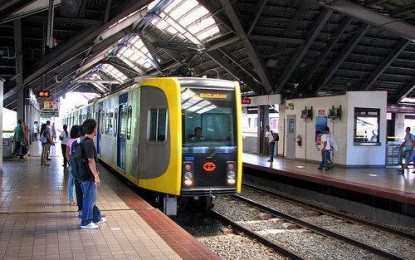
File photo
MANILA – The Inter-Agency Task Force for the Management of Emerging Infectious Diseases (IATF-EID) directed the Department of Transportation (DOTr) and concerned agencies to recommend protocols for the possible partial lifting of the public transport ban amid the coronavirus disease (Covid-19) pandemic.
In a virtual presser on Thursday, Presidential Spokesperson Harry Roque said this was among the new guidelines approved by the IATF.
In cooperation with the Departments of the Interior and Local Government (DILG), Tourism (DOT), and Health (DOH), Roque said the DOTr will have to come up with guidelines for the possible lifting of the public transport ban subject to existing guidelines on social-distancing, isolation, and quarantine.
“Inatasan na po ang DOTr kasama po ang DILG, DOT, DOH, at Bureau of Quarantine na pag-aralan na po at magrekomenda na ng mga protocol sa posibleng pagbukas po ng ating transportasyon (The DOTr, in cooperation with DILG, DOT, DOH, and BOQ to study and recommend protocols on the possible resumption of transportation) via air, land, and sea travel as modes of transportation subject to existing protocols and guidelines on social distancing, isolation, and quarantine,” he said.
In a Laging Handa public briefing on Wednesday, Transport Secretary Art Tugade said a partial lifting of the public transport ban is being eyed for personnel of essential services.
Tugade specifically said the IATF-EID is considering the limited operation of public utility buses (PUB) and trains in certain areas, based on studies presented by National Economic and Development Authority (NEDA) Secretary Karl Chua.
He said aside from certain PUBs, the IATF-EID is eyeing the resumption of limited operation of the Light Rail Transit Line 1 (LRT-1), LRT-2, Metro Rail Transit Line 3 (MRT-3), and the Philippine National Railways (PNR).
However, he clarified that should there be a partial resumption of transport operations, basic social distancing principles will have to be enforced not only inside public utility vehicles (PUVs) but also while passengers are waiting in line.
RapidPass
To decongest checkpoints amid the ECQ implementation, Roque also reminded the police and military to apply the RapidPass system, a virtual identification system that makes use of QR code technology, “prospectively.”
“Ibig sabihin lahat po ng ini-isyung ID ng IATF ay patuloy pa rin po kikilalanin (This means that all IDs being issued by the IATF will be recognized),” he said.
He said enrolment for the RapidPass system could be done voluntarily and shall cover private sector entities or individuals.
The RapidPass System was developed by the Department of Science and Technology (DOST), Department of Information and Communications Technology, Armed Forces of the Philippines, Philippine National Police, and DEVCON Community of Technology experts (DCTx), a non-profit digital solutions developer.
He also urged law enforcement authorities to ensure that movement of cargo vehicles as well as vehicles of public utility companies, business process outsourcing, and export-oriented establishments are unhampered with or without RapidSystem.
Qualified entities and individuals may apply for RapidPasses on the website rapidpass.ph. Once their application is verified and approved, they will receive a QR code, which they can either print or save on their device.
They may present their control number to the checkpoint personnel along with a valid ID to facilitate faster travel. (PNA)
